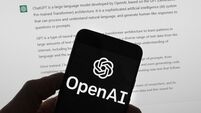AI's murky future to bring many years of instability

A Baidu Inc Apollo RT6 robotaxi travels on a road during Baidu's Apollo Day in Wuhan, China. The availability of AI-driven turn-by-turn directions on every phone has turned professional driving into mindless gig work for ride-hailing platforms. And when autonomous driving gets good enough (and it’s almost there), these jobs will disappear completely.
We are now two years into a transformation comparable in importance to the first Industrial Revolution. But with expert forecasts of the impact of artificial intelligence ranging from Panglossian to apocalyptic, can we really say anything yet about what it portends? I think we can.
First, neither nirvana nor human extinction will come anytime soon. Instead, we can look forward to many years of instability. AI technology will continue to make rapid progress, with ever more remarkable capabilities. We haven’t even exhausted the current transformer-based models (which rely heavily on brute force computation), and enormous efforts are underway to develop better models, semiconductor technologies, processor architectures, algorithms, and training methods. Eventually, we will get to artificial general intelligence systems that equal or surpass human intellect.














